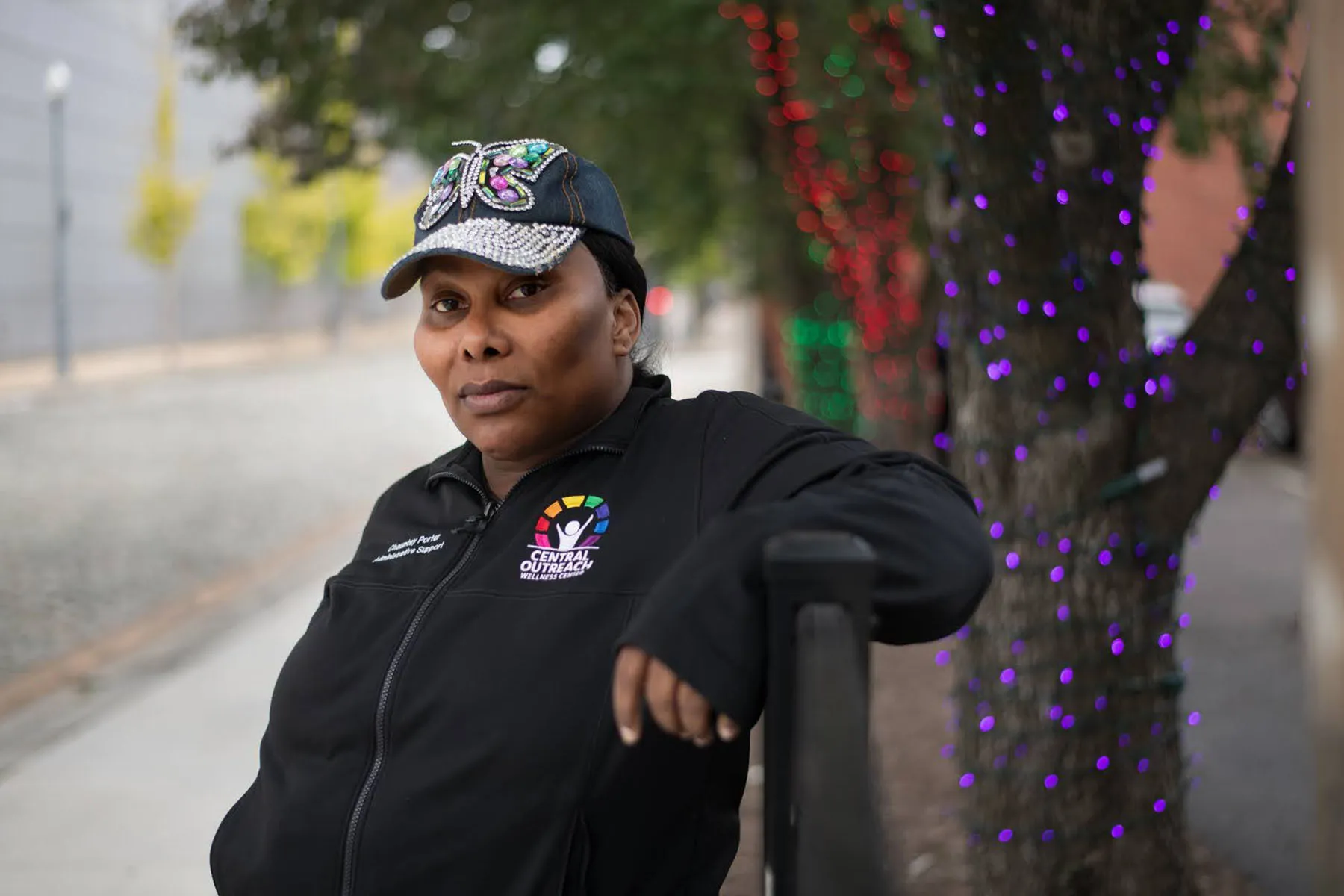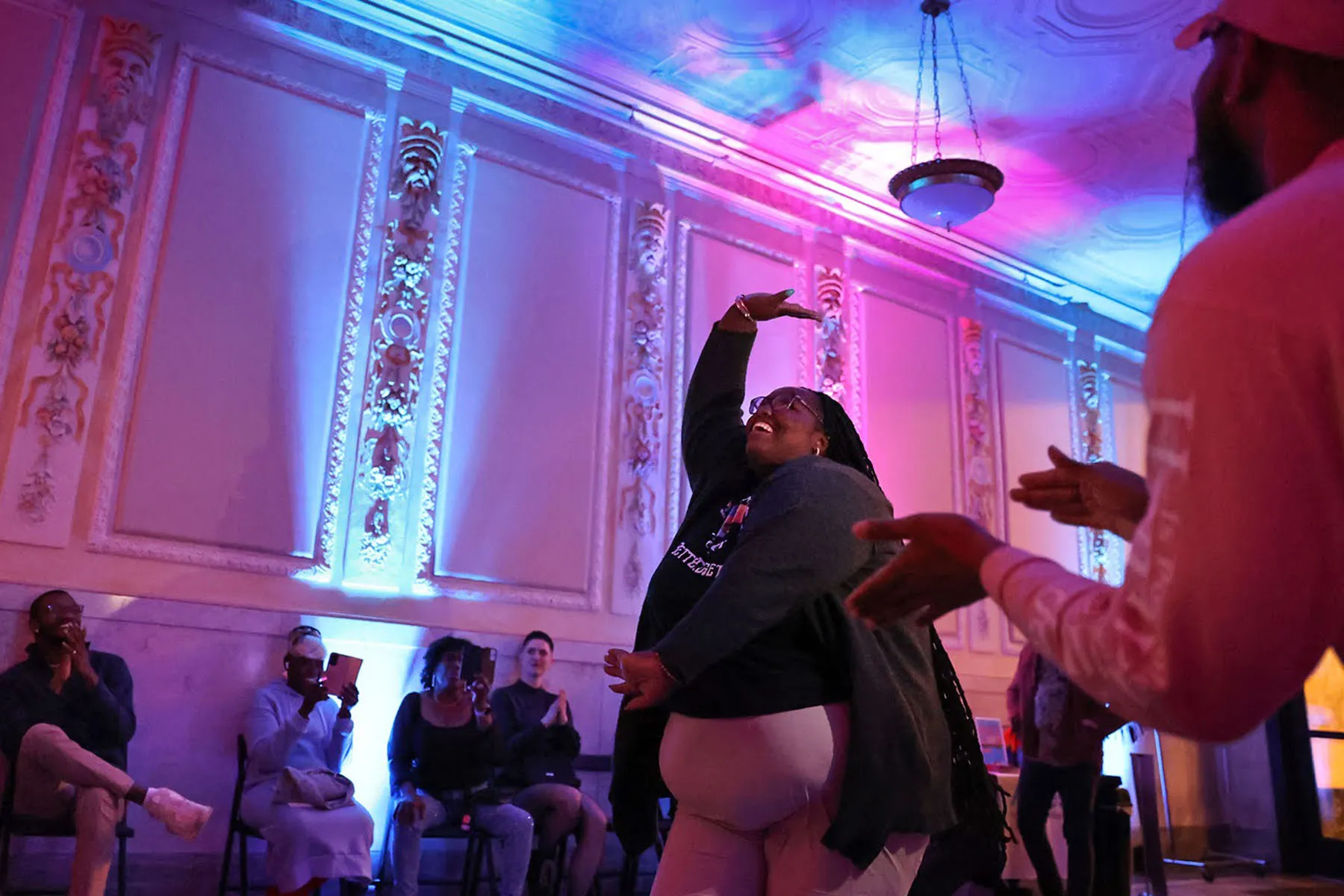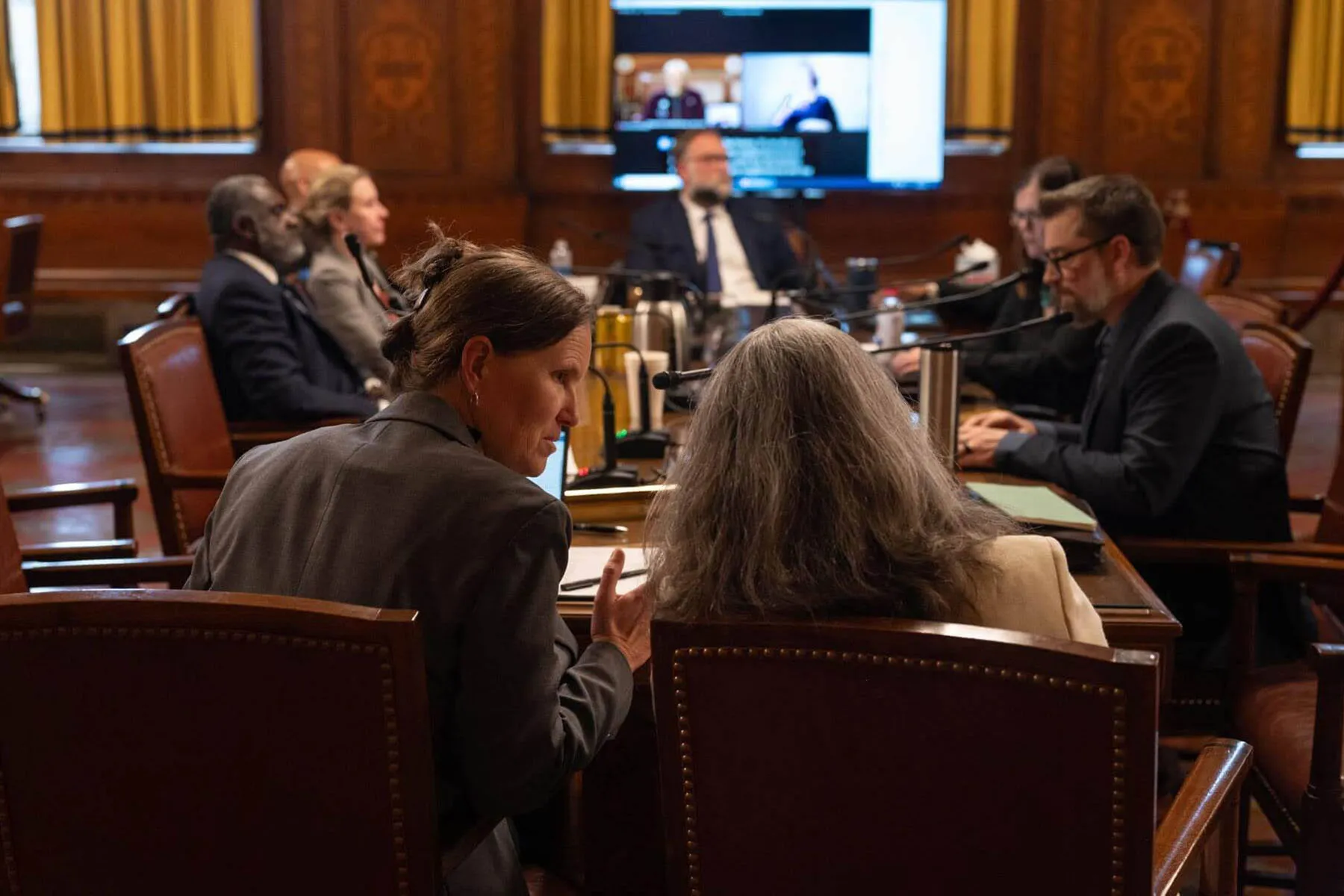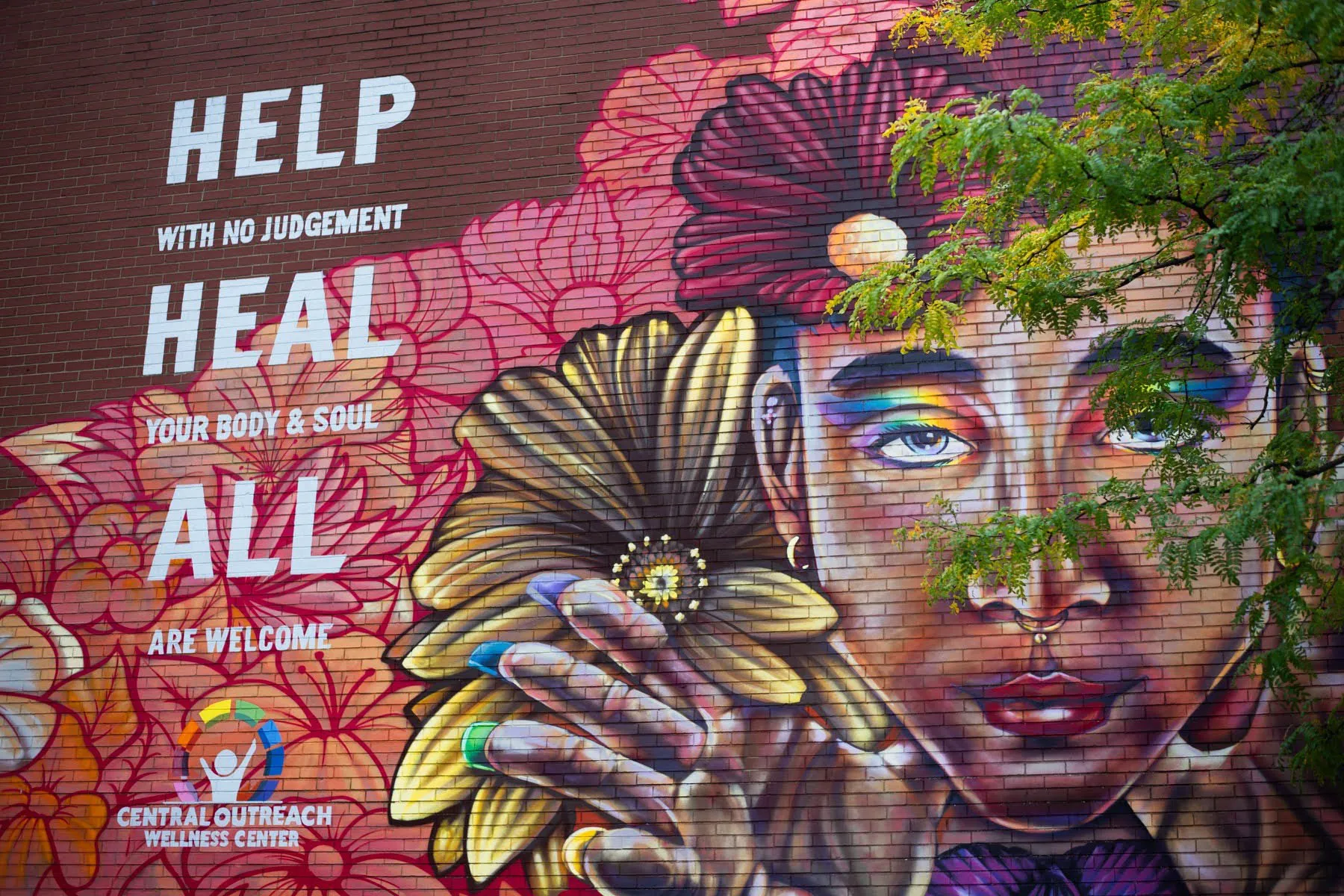Donald Trump’s hostility toward gender-affirming care has thrust trans rights into the center of a contentious election, raising anxiety about future federal support.

Chauntey Wilson, founder of The Love Diamond Project and president of TransYOUniting, on her work break at Central Outreach Wellness Center, on October 14, 2024, in Pittsburgh, Pennsylvania. (Stephanie Strasburg/PublicSource)
Chauntey Wilson, a formerly incarcerated transgender woman, got the health care she needed while Donald Trump was president. She fears others may not be able to if he’s elected to a second term.
Wilson, 45, sought care at a Pittsburgh clinic known for treating LGBTQ+ people soon after she was released from a Pennsylvania state prison in 2018. Growing up in Pittsburgh’s Hill District she faced crushing gender dysphoria and conflict with those who couldn’t understand her identity.
She was housed with men during two prison sentences spanning 16 years — a policy that exposes incarcerated trans women to an increased risk of verbal, physical and sexual abuse. And while there, she couldn’t access gender-affirming surgeries that would bring her body into closer alignment with her gender.
She qualified for Medicaid after she was released and continued the transition she’d started long before her incarceration. The state’s program covered her three surgeries, two of which were performed at Pittsburgh hospitals.
 Chauntey Wilson poses for a portrait on October 14, 2024, in Pittsburgh, Pennsylvania. Wilson’s gender-affirming surgeries were covered by Medicaid after she was released from prison. (Stephanie Strasburg/PublicSource)
Chauntey Wilson poses for a portrait on October 14, 2024, in Pittsburgh, Pennsylvania. Wilson’s gender-affirming surgeries were covered by Medicaid after she was released from prison. (Stephanie Strasburg/PublicSource)Wilson is now a member of the Pittsburgh LGBTQIA+ Commission and serves in leadership roles at two nonprofits that support trans people: TransYOUniting and The Love Diamond Project. She feels “lucky and blessed” because she found employment and built the life she wanted after suffering for so long.
It’s the kind of outcome that might not be possible for low-income trans people if Trump wins the 2024 presidential election. In a campaign video released last year, Trump vowed to ban federal funding for gender-affirming care as part of a broader plan to restrict access to these health services.
Down-ballot races could influence access, too: Twenty-six states have enacted laws limiting youth access to gender-affirming care. Though Pennsylvania isn’t among them, Republican members of the state House of Representatives have introduced legislation this year proposing legal protection for any parent who won’t consent to this kind of care for their child. Democrats have a one-vote majority in the House, while Republicans control the state Senate.
Those federal or state efforts could run counter to local sanctuary laws. Pittsburgh City Council passed two ordinances last year to shield gender-affirming care providers, recipients and their legal guardians from state or federal limitations. And earlier this month, Allegheny County Executive Sara Innamorato signed an executive order to extend similar protections to patients and providers.
PublicSource and The 19th spoke with experts, providers, elected officials and people with lived experience to find out how election outcomes — up and down the ballot — might impact gender-affirming care in Pittsburgh and beyond. Some expressed fear as polls show a close race between Trump and the Democratic nominee, Vice President Kamala Harris. Others, including Wilson, warned that the most vulnerable trans and nonbinary people — including those enrolled in Medicaid — would be disproportionately impacted by a federal ban. Nearly all said they were determined to keep serving trans youth and adults, regardless of election results.
“We’ll find a way,” said Ashley Durham, outreach and communications manager for the Hugh Lane Wellness Foundation, a North Side-based human services nonprofit that refers LGBTQ+ people to gender-affirming care providers.
How is gender-affirming care publicly funded?
Gender-affirming care is often associated with surgery, but it describes a range of social, medical and mental health services that support a person’s gender identity.
Many health care groups have endorsed it as life-saving care for trans and nonbinary people, and voiced opposition to government efforts to restrict it. They point to evidence showing it can prevent and treat gender dysphoria — the distress people feel when their bodies or society’s perceptions of them don’t align with their gender.
“I’ve had people come back to appointments and just say, ‘I never knew I could feel this good in my whole life,’” said Dr. Molly Fisher, an Allegheny Health Network primary care doctor who treats trans people at her North Side office.
Some state Medicaid programs cover certain gender-affirming health services because they’re widely considered medically necessary. Pennsylvania’s program covers surgery, hormone therapy, voice or communication therapy and behavioral health. But it doesn’t cover fertility services, according to a 2022 KFF report. Only two of the 41 states that responded to KFF’s survey — Maine and Illinois — reported covering all five services as of July 2021.
The Pennsylvania Department of Human Services [DHS] confirmed the report’s description of what the state will and won’t cover. Spokesperson Brandon Cwalina said the department and managed care organizations use the World Professional Association for Transgender Health’s guidelines to determine medical necessity for these services. Asked why the state’s program doesn’t cover gender-affirming fertility services, he said state law prohibits Medicaid from paying for infertility therapy “under any circumstances.”
Medicare will pay for surgery, hormone therapy and counseling, though Medicare Advantage plans offered by private companies may determine what’s medically necessary on a case-by-case basis.
And some federally qualified health centers [FQHCs], such as the Squirrel Hill Health Center, offer certain gender-affirming services to people regardless of their ability to pay. These facilities receive state and federal funding to treat uninsured and underinsured patients.

Trump’s plan to stop gender-affirming care
Trump detailed a plan in February 2023 to stop gender-affirming care. In August, his campaign surrogates doubled down on that plan, which includes: Asking Congress to “permanently stop federal taxpayer dollars from being used to promote or pay for these procedures,” including via Medicare and Medicaid
Signing an executive order instructing federal agencies to “cease all programs that promote the concept of sex and gender transition at any age”
Passing “a law prohibiting child sexual mutilation in all 50 states”
Declaring that hospitals and other facilities providing hormone therapy and gender-affirming surgeries “will no longer meet federal health and safety standards for Medicare and Medicaid — and will be terminated from the program”
“Protecting the rights of parents” who won’t consent to gender-affirming care for their children
Directing the U.S. Department of Education to inform states and school districts that they “will be faced with severe consequences,” including civil rights violations, “if any teacher or school official suggests to a child that they could be trapped in the wrong body.”
Experts said some of these proposals are rooted in falsehoods: Research shows most trans and nonbinary children don’t undergo surgery, though experts said it’s important to preserve access to those services for those who need them.
And schools aren’t promoting gender transition to students, nor are they sending them to health care facilities to receive surgeries — false claims Trump made at an event hosted by a conservative parent activist group.
“That is patently not happening,” said Lindsey Dawson, director of LGBTQ health policy and associate director of HIV policy at KFF. “Schools are not providing surgeries. Gender-affirming care is a careful, thoughtful process in decision making that happens between young people and their parents and providers.”
But some schools do have policies designed to support the identities of trans and nonbinary students, said Dena Stanley, founder and executive director of TransYOUniting on the North Side. These include using a child’s correct pronouns and allowing them to use bathrooms that align with their identity.
“All of this is fear-mongering, because people don’t understand or know the right information” about what’s happening in schools, said Stanley, who is a trans woman. “They’re out here telling people that these kids are going to get whole bottom surgeries at 9 years old, and that is so not true.”
 Dena Stanley, executive director of TransYOUniting, dances at the inaugural Rebirth Kiki Ball, an event inspired by the historical Ballroom community, on October 11, 2024 at the Kelly Strayhorn Theater in Pittsburgh, Pennsylvania. (Anastasia Busby/PublicSource)
Dena Stanley, executive director of TransYOUniting, dances at the inaugural Rebirth Kiki Ball, an event inspired by the historical Ballroom community, on October 11, 2024 at the Kelly Strayhorn Theater in Pittsburgh, Pennsylvania. (Anastasia Busby/PublicSource)Trump’s campaign didn’t respond to a list of questions asking for details on how his administration would adopt these proposals. But experts and providers described how it might play out.
Trump tried to roll back protections for trans people seeking health coverage when he was president, Dawson said. Section 1557 of the Affordable Care Act prohibits discrimination based on sex, among other characteristics, in federally funded health programs. Unlike the Obama administration, the Trump administration excluded gender identity from its definition of “sex,” which left trans people vulnerable to discrimination.
“We’re going back to the plain meanings of those terms, which is based on biological sex,” Roger Severino, who directed the Office of Civil Rights in the U.S. Department of Health and Human Services under Trump, said in 2019.
A federal judge blocked enforcement of Trump’s rule, so it’s unclear how it would affect trans and nonbinary people should he try again during a second term. (The Biden administration’s definition of sex includes gender identity, sexual orientation and sex characteristics, which extends protections to trans people.)
And Trump’s promise to ask Congress to ban federal funding for gender-affirming care might not have teeth if Republicans don’t perform well in congressional elections.
“What kind of coattails does he have?” asked John Finn, a professor emeritus of government at Wesleyan University who’s studied sanctuary movements. “Do the Senate Republicans take control of the Senate? Do [Republicans] increase their House majority, do they stay with the precarious majority they have or do they conceivably lose?
“All of that would affect the Trump administration’s calculations about whether to proceed through federal legislation.” A more effective approach might be through executive orders and regulations by federal agencies, he added.
Dr. Sheila Ramgopal is taking Trump’s pledge to put pressure on hospitals very seriously.

“Hospitals receive a lot of federal funding, a lot of big grant money,” said Ramgopal, an obstetrician and gynecologist, and the CEO of the Allegheny Reproductive Health Center, which accepts Medicaid for a variety of gender-affirming services.
“They could even eliminate people who are paying out of pocket” by threatening those facilities, they added.
Another doctor drew parallels between federal attempts to curtail abortion care and Trump’s promises around gender-affirming care.
Dr. Andrea Fox, an internal medicine specialist, described how the Hyde Amendment keeps providers at FQHCs from helping vulnerable patients — including pregnant refugees — by largely banning the use of federal funds for abortion. The amendment took effect in 1977 and was part of backlash to the Roe v. Wade ruling.
She believes the federal government could adopt similar legislation to ban the use of federal funds for gender-affirming care, which is offered by some FQHCs. But she can’t imagine how it would enforce a ban on care that can include everything from hormone therapy to using a patient’s correct pronouns to “the kind of pictures you have hung” around the office.
“Who knows if they really have a plan?” said Fox, who was the chief medical officer of a local FQHC before leaving her position this year. “Because they say they have a plan for doing all kinds of things, but they don’t.”
Why trans identity is being politicized
Trump and other Republicans have described their rationale for restricting gender-affirming care: preserving the nuclear family and traditional gender roles.
It’s part of a backlash to Obergefell v. Hodges — the landmark Supreme Court ruling that required all states to license marriages between same-sex couples, and recognize marriages lawfully performed out of state, according to Loren Cannon, a philosophy instructor at California State Polytechnic University, Humboldt.
Conservatives viewed it as “the tip of a dangerous iceberg,” Cannon wrote in his book exploring the politicization of trans identity. He argues it’s why they’re working to prevent further acceptance of the LGBTQ+ community, whose most vulnerable members are trans.
The strategy led to an explosion of anti-trans bills introduced to state legislatures: 661 bills were under consideration so far this year, up from 143 bills in 2021, according to Trans Legislation Tracker, a research organization. Of those, 181 bills aimed to prohibit gender-affirming care.
Pennsylvania lawmakers have brought at least two of those bills. House Republicans introduced a package of anti-trans bills in March, including one that would grant civil immunity to parents who refuse to consent to gender-affirming care for their child, and another that would prevent a judge hearing a child custody dispute from considering a parent’s refusal to consent to gender-affirming care for their child. The bills were referred to the House Judiciary Committee, but have not advanced to the floor for a vote.
Rep. Robert Leadbeter, R-Columbia County, introduced both bills, saying they would protect “freedom of speech and overall parental authority.” His spokesperson didn’t respond when asked why he opposed care that providers say is medically necessary, and if he would introduce future legislation that could affect access to it.
Democratic nominee Harris is serving as vice president under President Joe Biden, whose administration has fought in court to defend or extend discrimination protections for trans individuals.
Cannon said policies aiming to restrict care for trans kids are designed to appeal to a value people can’t disagree with: “We need to protect the children.” In his campaign video, Trump called gender-affirming care “child abuse” and “the chemical, physical and emotional mutilation of our youth.”
That kind of rhetoric “paints the population as deviant, as monstrous, as mentally ill” for pursuing this care. “In fact, it’s the opposite,” said Cannon, who is a trans man. Research shows gender-affirming care can reduce the disproportionate risks trans kids face, including suicidality and becoming victims of violence.
One Pittsburgh lawmaker said this rhetoric has become so toxic that he was accosted for supporting trans kids.

After a trans teen and her family alleged they were harassed on the North Side, City Councilor Bobby Wilson worked with three teens to declare Sept. 12, 2022, as “Protect Trans Kids Day” in Pittsburgh. And together with Councilor Barb Warwick and former Councilor Bruce Kraus, he co-sponsored two sanctuary bills protecting access to gender-affirming care in the city, both of which were approved by the all-Democrat panel.
Wilson faced blowback from a constituent, who yelled at him while he was shopping at a farmer’s market in Allegheny Commons Park about a month after Protect Trans Kids Day.
“They told me they knew that I had a daughter and said, ‘What if it was your daughter?’” said Wilson, who was disturbed by the encounter and considered reporting it to police. “Then he said something to the effect of, ‘You’re evil, you’re destroying kids, you’re sick.’”
Do sanctuary cities have the power to flout state and federal law?
More cities and states are joining Pittsburgh by declaring themselves LGBTQ+ sanctuaries, mirroring the movement that refused to cooperate with Trump’s hard-line immigration policies when he was president.
But how powerful are these sanctuaries when they’re up against the U.S. Constitution, which says federal law takes precedence over conflicting state or local laws?
It depends on the language of the legislation, said Finn, the Wesleyan professor emeritus who’s written about the constitutionality of sanctuary cities. Some are symbolic declarations with no legal impact. Others directly challenge the Constitution’s Supremacy Clause by declaring that local officials won’t enforce or comply with federal law, which could result in lawsuits.
Pittsburgh lawmakers chose a third way: If a state or federal law criminalizes gender-affirming care, city officials will deprioritize its enforcement, according to one of the two sanctuary ordinances.

Enforcing it “will be at the bottom of our [priority] list,” Councilor Warwick told PublicSource last year.
Finn said there’s nothing legally wrong with that, but it does mean that city officials have a limited amount of power in protecting residents and non-residents seeking care.
The other ordinance aims to keep gender-affirming care providers and recipients safe from out-of-state prosecution by barring city employees from assisting those investigations. It wouldn’t apply to actions required by Pennsylvania and federal laws, but city officials can “refuse to comply with a request by Ohio or West Virginia to turn over information about gender-affirming care,” Finn said.
Like the city ordinance, Innamorato’s executive order bars county employees from assisting out-of-state investigations seeking to punish those providing or seeking gender-affirming care and reproductive care, including abortions.

“Health care providers in Allegheny County, we have your back,” Innamorato said in a press release. “ … We trust you to make right decisions with your patients.”
One advocate wants Pennsylvania’s Democratic governor, Josh Shapiro, to protect trans people through an executive order, as it’s unlikely the divided state legislature will pass legislation.
“Hey Gov. Shapiro, publicly say you’re making this a sanctuary state for trans people and access to gender-affirming care,” said Naiymah Sanchez, a Philadelphia-based senior organizer at the ACLU of Pennsylvania. She’s a trans woman who connects people with gender-affirming care in the city as part of a personal project called “Our Journeys to Healing.”
At least 14 states and the District of Columbia have passed shield laws protecting access to care, while two have issued executive orders, according to the Movement Advancement Project, a think tank that tracks policies related to LGBTQ+ people. Pennsylvania isn’t one of them.
Shapiro’s press team didn’t respond when asked if he would issue an executive order. Cwalina, the DHS spokesperson, said his administration “is committed to making sure everyone is protected, feels welcome and can thrive in the Commonwealth of Pennsylvania.”

How are patients and providers affected by campaign rhetoric?
Some patients and providers are preparing for the worst as Election Day approaches.
“Our clients are already making decisions about what kind of surgeries they’re getting in anticipation of these federal-level or state-level bans,” said Ramgopal, of the Allegheny Reproductive Health Center.
Several of Ramgopal’s patients have chosen to keep an ovary when getting a hysterectomy — in case they lose access to testosterone therapy and need to prevent the adverse health outcomes that can result from lack of sex hormones.
And if the state or federal government criminalizes providers?
“We literally have a bail fund for me,” added Ramgopal, who also provides abortion care.
Sanchez worries about what this uncertainty will do to young trans people, many of whom are just starting their journeys with gender-affirming care. A recent study in the journal “Nature” found suicide attempts among trans and nonbinary youth increased as anti-trans laws were introduced from 2018 to 2022.
“I’m tearing up right now because I know what it was like for me to exist as a young person, not even having the language to describe who I was, but knowing in my heart,” she said. “I don’t want anyone to have to go through what I went through.”
At least one young person wants political candidates to remember that trans people, though a small portion of the population, are voters, too.

Ace Blackwell, a trans man, is one of the teens who worked with Councilor Wilson to craft the Protect Trans Kids Day proclamation. His experience with gender dysphoria led to an eating disorder that caused him to miss 114 days of school while in treatment. He was 14 at the time.
Blackwell credits his supportive family, friends and community for his recovery. Now 18, he’ll be voting for Harris.
“Trans health care is just health care,” he said. “So trying to cut funding and restrict people [from] learning about it is setting up so many people to have a significantly worse life,” he added.
Chauntey Wilson said the stakes are highest for trans people who are Black or other people of color, low-income, unemployed or formerly incarcerated — all experiences she can identify with. Without Medicaid coverage or other types of federal or state funding, “this community is going to be lost.”
This story was fact-checked by Simi Kadirgamar.
This article was co-published with PublicSource, an independent nonprofit newsroom serving the Pittsburgh region.
ZNetwork is funded solely through the generosity of its readers. Donate
Venuri Siriwardane is PublicSource’s health and mental health reporter. She can be reached at venuri@publicsource.org or on X, formerly known as Twitter, @venuris.








